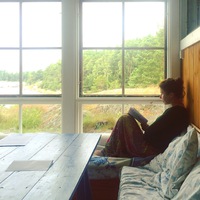Интересно, как субъективно наше, "европейское", понятие о счастье.
Мы считаем, что все в мире такие же как мы. Приходим в страны Востока и при чём не для того ,чтобы их ограбить или захватить - для того ,чтобы навязать им счастье. Ведь только мы знаем какое оно, настоящее счастье.
Но люди разные. Для монгола ,его жизнь ,это кочевье, юрта, родная степь. И многие кочевники ,ни за какие деньги (кстати, деньги у них есть!) Не откажутся сменить юрту и лошадь - на квартиру и автомобиль.
В мавританской пустыни, с нашей точки зрения, живут дичайшие верблюдоводы. Но заметьте, они торопятся на встречу унитазу и ночному клубу. Им хорошо среди мусора Нуакшота и в "Логове Шакала". Для них верблюды, рабы и отсутствие комфорта и есть счастье. Счастье жить так, как жили их предки.
Туарег, хозяин Сахары, племена Рио де Оро и Сегиет Аль Хамра, бедуины Синая таки пересели с верблюдов на дефендеры - но живут они как и прежде. Тяги к университетам и унитазам здесь замечено не было.
А афганцы? Если они и бегут на Запад, то точно не ради западных ценностей!
Есть высоко в Ваханских горах Афганистана киргизская община. Там детская смертность 50%. Туда инет даже конных троп. Киргизы передвигаются на яках. Там самая тяжёлая жизнь в Евразии. Но они счастливы. И несмотря на значительные усилия по из переселению, многие киргизы остаются там, на высоте с выше 4000 метров, отрезанные от всего мира, но счастливые.
Можно сказать, что эти люди просто не знают о нашем европейском счастье. Но это не правда. Интернет уже есть даже там , где нет туалета.
Или ладно. Фиг с ними, с дальними и неизвестными племенами. А вот цыгане? Или евреи-пейсы? Они тоже ничего не знают о другой , счастливой европейской жизни? Может всё таки знают, но не хотят присоединяться?
И кто сказал,что успешный бизнесмен из условной Москвы счастливее монгольского кочевника или туарега-верблюдовода или цыгана-люли?
Вопрос личного счастья, очень относительный и индивидуальный вопрос. Ведь вместе с европейским комфортом и уровнем жизни , появляются различные духовные терзания проблемы и страхи, разрешить которые, гораздо сложнее чем справится с наличием или отсутствием унитаза.
Мы считаем, что все в мире такие же как мы. Приходим в страны Востока и при чём не для того ,чтобы их ограбить или захватить - для того ,чтобы навязать им счастье. Ведь только мы знаем какое оно, настоящее счастье.
Но люди разные. Для монгола ,его жизнь ,это кочевье, юрта, родная степь. И многие кочевники ,ни за какие деньги (кстати, деньги у них есть!) Не откажутся сменить юрту и лошадь - на квартиру и автомобиль.
В мавританской пустыни, с нашей точки зрения, живут дичайшие верблюдоводы. Но заметьте, они торопятся на встречу унитазу и ночному клубу. Им хорошо среди мусора Нуакшота и в "Логове Шакала". Для них верблюды, рабы и отсутствие комфорта и есть счастье. Счастье жить так, как жили их предки.
Туарег, хозяин Сахары, племена Рио де Оро и Сегиет Аль Хамра, бедуины Синая таки пересели с верблюдов на дефендеры - но живут они как и прежде. Тяги к университетам и унитазам здесь замечено не было.
А афганцы? Если они и бегут на Запад, то точно не ради западных ценностей!
Есть высоко в Ваханских горах Афганистана киргизская община. Там детская смертность 50%. Туда инет даже конных троп. Киргизы передвигаются на яках. Там самая тяжёлая жизнь в Евразии. Но они счастливы. И несмотря на значительные усилия по из переселению, многие киргизы остаются там, на высоте с выше 4000 метров, отрезанные от всего мира, но счастливые.
Можно сказать, что эти люди просто не знают о нашем европейском счастье. Но это не правда. Интернет уже есть даже там , где нет туалета.
Или ладно. Фиг с ними, с дальними и неизвестными племенами. А вот цыгане? Или евреи-пейсы? Они тоже ничего не знают о другой , счастливой европейской жизни? Может всё таки знают, но не хотят присоединяться?
И кто сказал,что успешный бизнесмен из условной Москвы счастливее монгольского кочевника или туарега-верблюдовода или цыгана-люли?
Вопрос личного счастья, очень относительный и индивидуальный вопрос. Ведь вместе с европейским комфортом и уровнем жизни , появляются различные духовные терзания проблемы и страхи, разрешить которые, гораздо сложнее чем справится с наличием или отсутствием унитаза.
It is interesting how subjectively our, "European" concept of happiness.
We believe that everyone in the world is like us. We come to the countries of the East and have nothing to do with it in order to rob them or seize them - in order to impose happiness on them. After all, only we know what it is, real happiness.
But people are different. For a Mongol, his life is a nomadic, a yurt, a native steppe. And many nomads, for any money (by the way, they have money!) They will not refuse to change the yurt and the horse - to an apartment and a car.
In our Mauritanian desert, from our point of view, live the wildest camels. But note, they are in a hurry to meet the toilet and nightclub. They are well among the rubbish of Nouakchott and in the Jackal's Lair. For them, camels, slaves, and lack of comfort is happiness. Happiness to live as their ancestors lived.
The Tuareg, the owner of the Sahara, the tribes of Rio de Oro and Segiet Al Hamra, the Sinai Bedouins did move from camels to defender, but they still live as before. Traction to universities and toilets was not noticed here.
And the Afghans? If they run to the West, then definitely not for the sake of Western values!
There is a high Kyrgyz community in the Wakhan Mountains of Afghanistan. There, child mortality is 50%. There are even horse trails inet. Kirghiz move on yaks. There is the hardest life in Eurasia. But they are happy. And despite significant resettlement efforts, many Kyrgyz remain there, at heights from above 4,000 meters, cut off from the whole world, but happy.
We can say that these people simply do not know about our European happiness. But this is not true. The Internet is already there even where there is no toilet.
Or alright. Figs with them, with distant and unknown tribes. But the gypsies? Or Jewish Paces? They also know nothing about another, happy European life? Maybe they still know, but do not want to join?
And who said that a successful businessman from a conditional Moscow is happier than a Mongol nomad or a Tuareg camel guide or a gypsy-lyuli?
The question of personal happiness, a very relative and individual question. Indeed, together with European comfort and standard of living, there are various spiritual torments of problems and fears, which are much more difficult to resolve than to cope with the presence or absence of a toilet bowl.
We believe that everyone in the world is like us. We come to the countries of the East and have nothing to do with it in order to rob them or seize them - in order to impose happiness on them. After all, only we know what it is, real happiness.
But people are different. For a Mongol, his life is a nomadic, a yurt, a native steppe. And many nomads, for any money (by the way, they have money!) They will not refuse to change the yurt and the horse - to an apartment and a car.
In our Mauritanian desert, from our point of view, live the wildest camels. But note, they are in a hurry to meet the toilet and nightclub. They are well among the rubbish of Nouakchott and in the Jackal's Lair. For them, camels, slaves, and lack of comfort is happiness. Happiness to live as their ancestors lived.
The Tuareg, the owner of the Sahara, the tribes of Rio de Oro and Segiet Al Hamra, the Sinai Bedouins did move from camels to defender, but they still live as before. Traction to universities and toilets was not noticed here.
And the Afghans? If they run to the West, then definitely not for the sake of Western values!
There is a high Kyrgyz community in the Wakhan Mountains of Afghanistan. There, child mortality is 50%. There are even horse trails inet. Kirghiz move on yaks. There is the hardest life in Eurasia. But they are happy. And despite significant resettlement efforts, many Kyrgyz remain there, at heights from above 4,000 meters, cut off from the whole world, but happy.
We can say that these people simply do not know about our European happiness. But this is not true. The Internet is already there even where there is no toilet.
Or alright. Figs with them, with distant and unknown tribes. But the gypsies? Or Jewish Paces? They also know nothing about another, happy European life? Maybe they still know, but do not want to join?
And who said that a successful businessman from a conditional Moscow is happier than a Mongol nomad or a Tuareg camel guide or a gypsy-lyuli?
The question of personal happiness, a very relative and individual question. Indeed, together with European comfort and standard of living, there are various spiritual torments of problems and fears, which are much more difficult to resolve than to cope with the presence or absence of a toilet bowl.

У записи 33 лайков,
1 репостов,
1054 просмотров.
1 репостов,
1054 просмотров.
Эту запись оставил(а) на своей стене Леонид Ланда





















































